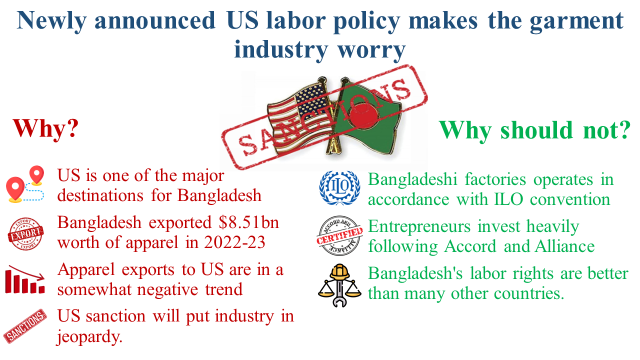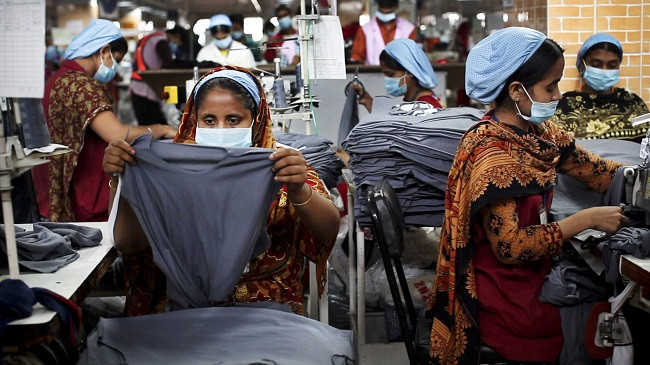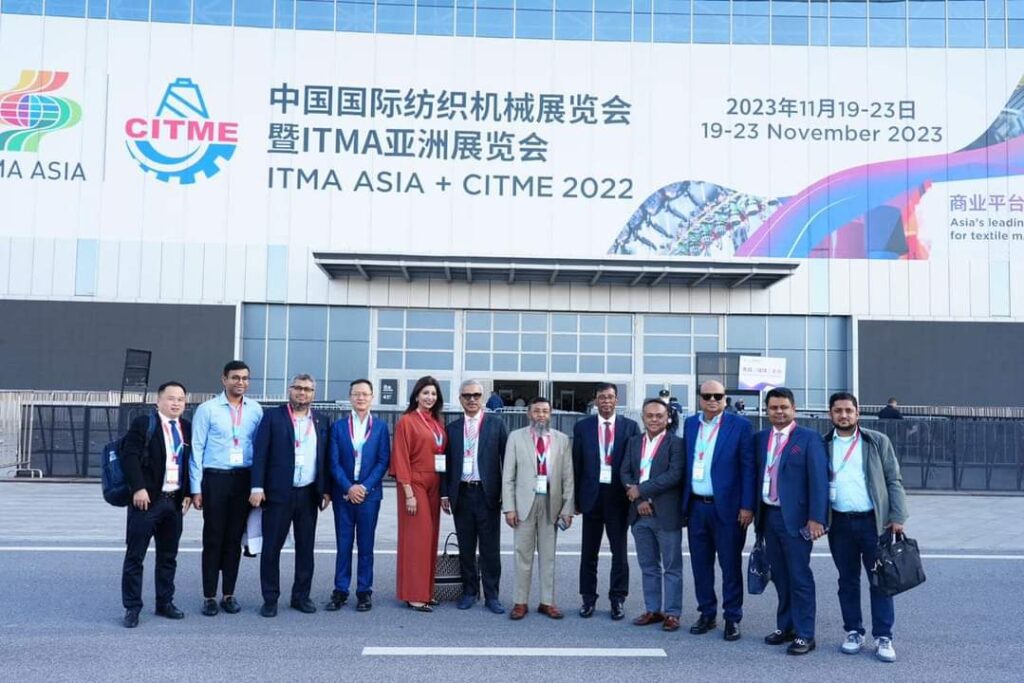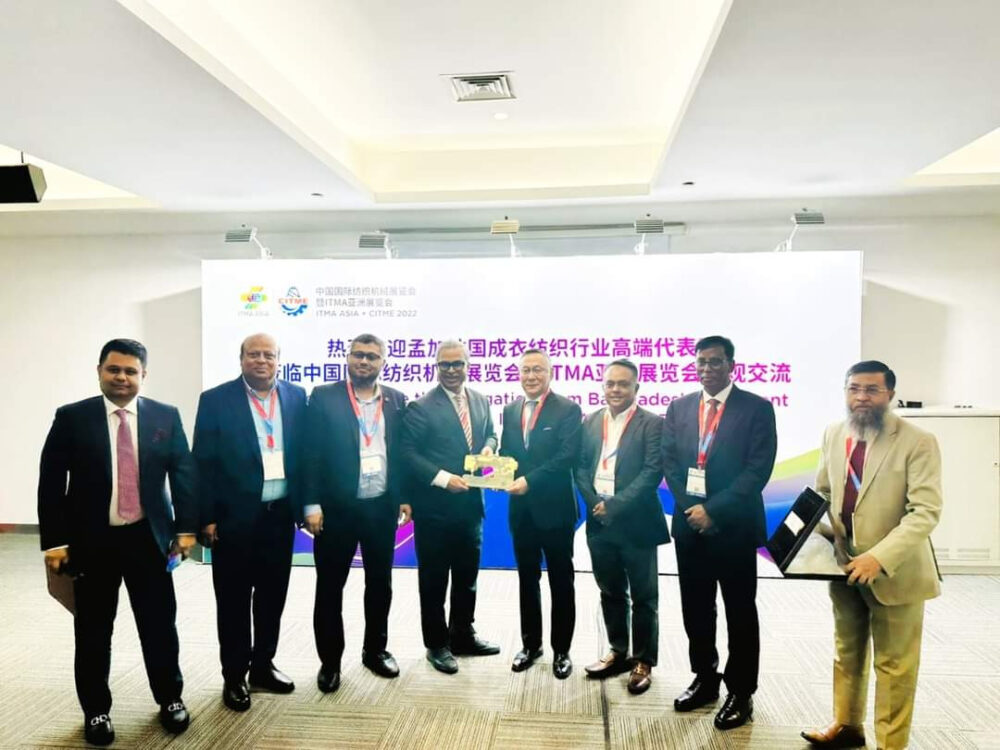Newly announced US labor policy makes the garment industry worry
Entrepreneurs say, need not to worry as Bangladeshi factories operate in accordance with the ILO convention and invest heavily in working environment and worker safety following Accord and Alliance. But the political context has many reasons to be alarmed
The new policy of the United States to ensure labor rights around the world has worried the exporters of Bangladesh. Especially the entrepreneurs of the clothing sector expressed concern and said that if the United States implements its new policy on labor rights issues on Bangladesh, it will have a major negative impact on the country’s export sector.

Quite suddenly, US President Joe Biden issued instructions for punitive measures including trade bans and visa restrictions against ‘labor rights violators’. Last Thursday, he signed a memorandum titled ‘Memorandum on Advancing Worker Empowerment, Rights and High Labor Standards Globally’.
US Secretary of State Antony Blinken said last Thursday that the United States will work to protect the rights of workers in accordance with international labor laws involving governments, workers, labor organizations, trade unions, civil society and the private sector. He said, those who will go against the rights of the workers, threaten and intimidate the workers, if necessary, sanctions will be imposed on them.
The announcement by the US on labor rights comes at a time when there is unrest in Bangladesh over the minimum wage in the garment sector. The workers went on strike. Again, the United States has implemented visa policies to ensure free and fair elections. In this situation, the new policy on labor rights has increased the concerns of exporters.
United States is a major destination for the country’s garment exports. Bangladesh is the third top country in apparel exports in the US. Apart from clothing, Bangladesh exports various products including home textile, frozen fish, leather products, and plastic products to the US market.
According to the Export Promotion Bureau (EPB) data, in the last fiscal year 2022-23, total exports of Bangladeshi goods to the United States were $9.7 billion. Out of which the export of ready-made garments was $8.51 billion.
Already, apparel exports to the US market this year are in a somewhat negative trend. According to EPB data, U.S.-made apparel exports fell more than 3 percent in the four months from July to October compared with the same period a year earlier. In this situation, the industry people worry that the United States’ sanction will put industry in jeopardy.
AK Azad, Managing Director of Ha-Meem Group, a leading exporter of ready-made garments said, “We are worried about this new policy of the United States. From what we understand so far, it seems that there is scope for this policy to be imposed at the individual level as well as at the state level. So now the issue should be looked at diplomatically very seriously.”
A former leader of BGMEA said on condition of anonymity, “We are concerned about this. Because there has been worker dissatisfaction in the country for quite some time.”
However, the announcement of the United States is not applicable to the garment sector of Bangladesh, the leaders of BGMEA saying that the factories here are being operated in accordance with the International Labor Organization (ILO) convention. The industry has to pass many types of public and private audits to operate in this country. Any question of violation of labor laws does not apply to the garment industry of Bangladesh.
Entrepreneurs say they have, and continue to, invest heavily in improving the working environment and worker safety following the recommendations of Accord and Alliance, a coalition of Western buyers and labor unions, following the Rana Plaza disaster. There is no reason to fear Bangladesh in terms of labor rights. But the political context has many reasons to be alarmed. Considering the context of geopolitical and internal politics, Bangladesh is now in tension with the United States. Many believe that the United States could use any number of tools to impose sanctions amid political tensions.
Shahidullah Azim, Vice-President of BGMEA said, “There is definitely fear, because the exporters do not sell clothing products in the local market, but in the international market. As a result, if any obstacle comes, it is supposed to be difficult for us. However, the United States has said that those who do not obey labor laws, do not control labor standards will be punished. If one does his job properly, follows the law, there will be no reason to fear.”

Syed Mohammad Tanveer, Managing Director of Pacific Jeans Group also thinks, “We have no weakness. We have ratified many ILO conventions. According to ILO standards, Bangladesh’s labor rights are better than many other countries. There is no reason to fear. Our garment industry are far ahead in compliance ratings according to standards set by Western buyers. All small, medium and large factories are in a better position than many other countries in terms of fire and building safety, worker safety and rights.”
Mohammad Hatem, Executive President of BKMEA said, “There is no reason to fear on this issue. There has not been any incident regarding labor rights in our country, is happening or will not happen that any such action has to be taken. We do not have that much weakness. Many countries have very fragile conditions in these areas, Bangladesh is much better. I don’t think that our working environment and labor rights are any such situation to impose any kind of sanction.”
However, many people would be afraid of this announcement. In this case, politics is behind what is said about labor rights. They are trying to use the political purpose in different ways. Some with the name of labor leaders are running various processes to disturb our garment sector. It is now clear that many people do not like the progress of Bangladesh economically, he added.
Fazlul Haque, the former president of BKMEA, feels that there is nothing to panic about this announcement by the US, but one should be careful. Besides, the efforts to improve the labor standards of Bangladesh should also be continued.
He said, “Bangladesh’s overall labor standards are better than competing countries such as: Vietnam, Cambodia, China, India, and Pakistan. Workers may demand an increase in wages in view of inflation. But whether the industry has the capacity to accommodate it should also be taken into consideration.”
Industry stakeholders claim that Bangladesh’s garment industry has achieved an unprecedented level of labor-friendly environment and other compliance; and should convey it to them through effective communication with buyers, brands and the international community.




















